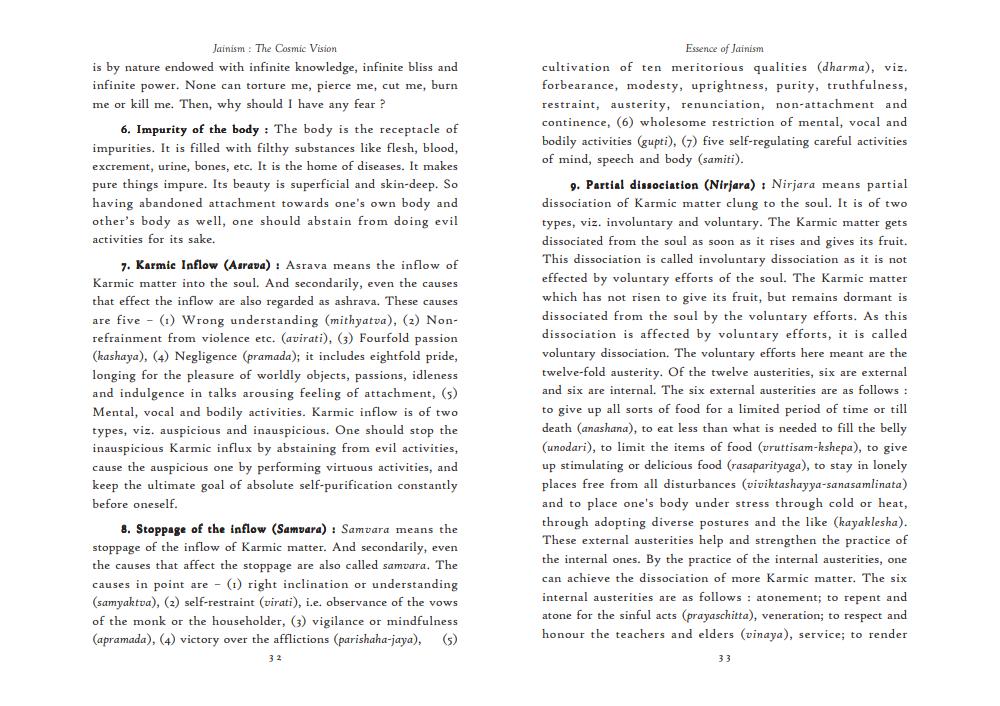________________
Jainism: The Cosmic Vision is by nature endowed with infinite knowledge, infinite bliss and infinite power. None can torture me, pierce me, cut me, burn me or kill me. Then, why should I have any fear ?
6. Impurity of the body : The body is the receptacle of impurities. It is filled with filthy substances like flesh, blood, excrement, urine, bones, etc. It is the home of diseases. It makes pure things impure. Its beauty is superficial and skin-deep. So having abandoned attachment towards one's own body and other's body as well, one should abstain from doing evil activities for its sake.
7. Karmic Inflow (Aarava): Asrava means the inflow of Karmic matter into the soul. And secondarily, even the causes that effect the inflow are also regarded as ashrava. These causes are five - (1) Wrong understanding (mithyatva), (2) Nonrefrainment from violence etc. (avirati), (3) Fourfold passion (kashaya), (4) Negligence (pramada); it includes eightfold pride, longing for the pleasure of worldly objects, passions, idleness and indulgence in talks arousing feeling of attachment, (s) Mental, vocal and bodily activities. Karmic inflow is of two types, viz. auspicious and inauspicious. One should stop the inauspicious Karmic influx by abstaining from evil activities, cause the auspicious one by performing virtuous activities, and keep the ultimate goal of absolute self-purification constantly before oneself.
8. Stoppage of the inflow (Samvara) : Samvara means the stoppage of the inflow of Karmic matter. And secondarily, even the causes that affect the stoppage are also called samvara. The causes in point are - (1) right inclination or understanding (samyaktva), (2) self-restraint (virati), i.e. observance of the vows of the monk or the householder, (3) vigilance or mindfulness (apramada), (4) victory over the afflictions (parishaha-jaya), (5)
Essence of Jainism cultivation of ten meritorious qualities (dharma), viz. forbearance, modesty, uprightness, purity, truthfulness, restraint, austerity, renunciation, non-attachment and continence, (6) wholesome restriction of mental, vocal and bodily activities (gupti), () five self-regulating careful activities of mind, speech and body (samiti).
9. Partial disociation (Nirjara) : Nirjara means partial dissociation of Karmic matter clung to the soul. It is of two types, viz. involuntary and voluntary. The Karmic matter gets dissociated from the soul as soon as it rises and gives its fruit. This dissociation is called involuntary dissociation as it is not effected by voluntary efforts of the soul. The Karmic matter which has not risen to give its fruit, but remains dormant is dissociated from the soul by the voluntary efforts. As this dissociation is affected by voluntary efforts, it is called voluntary dissociation. The voluntary efforts here meant are the twelve-fold austerity. Of the twelve austerities, six are external and six are internal. The six external austerities are as follows: to give up all sorts of food for a limited period of time or till death (anashana), to eat less than what is needed to fill the belly (unodari, to limit the items of food (uruttisam-kshepa), to gi up stimulating or delicious food (rasaparityaga), to stay in lonely places free from all disturbances (viviktashayya-sanasamlinata) and to place one's body under stress through cold or heat, through adopting diverse postures and the like (kayaklesha). These external austerities help and strengthen the practice of the internal ones. By the practice of the internal austerities, one can achieve the dissociation of more Karmic matter. The six internal austerities are as follows: atonement; to repent and atone for the sinful acts (prayaschitta), veneration; to respect and honour the teachers and elders (vinaya), service; to render




